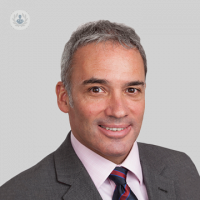What is hip resurfacing?
Hip resurfacing is a type of hip replacement which replaces the surfaces of the hip joint and preserves more bone than a total hip replacement surgical procedure. Unlike with total hip replacement surgery, the head of the femur (the ball) is not removed but it is reshaped so that a metal cap is cemented on top of it. The surface of the socket (acetabulum) is replaced with a metal implant, wedged directly into the bone.

Why is it done?
Hip resurfacing is thought to have certain advantages over a total hip replacement.
Firstly, the prosthetic parts used in any joint replacement wear out over time and typically must be replaced after 15-20 years in a procedure called a revision hip replacement. Revisions are much easier after hip resurfacing.
What are the benefits of hip resurfacing?
Hip resurfacing makes the ball of the joint larger than it was before, thus decreasing the risk of dislocation. It has also been claimed that hip resurfacing restores a more natural gait than a total hip replacement.
What does hip resurfacing involve?
Hip resurfacing is a surgical procedure that lasts between one and three hours. Patients are usually admitted to hospital prior to the procedure and will be put under general anaesthetic to render them unconscious during the operation.
The surgeon makes an incision in the thigh and dislocates the head of the femur from its socket. The head is trimmed and reshaped, and then a metal cap is cemented on top to become the new 'surface' of the bone. The old cartilage in the socket is also removed and a metal cup is fitted in its place. The femoral head, complete with metal cap, is clicked back into the socket, now also lined with metal. The surgeon then closes the incision.
After surgery you will be taken to the recovery room, where you will be closely monitored by nurses as you recover from the anaesthesia. You will then be taken to your hospital room.

What's involved in the aftercare of hip resurfacing?
The patient will need to stay in the hospital for 1 to 4 days, while they recover. They may require a walking aid, such as a crutch at first. Pain medication will likely be prescribed to deal with post-operative pain, and some physiotherapy is often required to help the leg recover its mobility.
05-29-2018 09-20-2023Hip resurfacing
Mr Tony Andrade - Orthopaedic surgery
Created on: 05-29-2018
Updated on: 09-20-2023
Edited by: Karolyn Judge
What is hip resurfacing?
Hip resurfacing is a type of hip replacement which replaces the surfaces of the hip joint and preserves more bone than a total hip replacement surgical procedure. Unlike with total hip replacement surgery, the head of the femur (the ball) is not removed but it is reshaped so that a metal cap is cemented on top of it. The surface of the socket (acetabulum) is replaced with a metal implant, wedged directly into the bone.

Why is it done?
Hip resurfacing is thought to have certain advantages over a total hip replacement.
Firstly, the prosthetic parts used in any joint replacement wear out over time and typically must be replaced after 15-20 years in a procedure called a revision hip replacement. Revisions are much easier after hip resurfacing.
What are the benefits of hip resurfacing?
Hip resurfacing makes the ball of the joint larger than it was before, thus decreasing the risk of dislocation. It has also been claimed that hip resurfacing restores a more natural gait than a total hip replacement.
What does hip resurfacing involve?
Hip resurfacing is a surgical procedure that lasts between one and three hours. Patients are usually admitted to hospital prior to the procedure and will be put under general anaesthetic to render them unconscious during the operation.
The surgeon makes an incision in the thigh and dislocates the head of the femur from its socket. The head is trimmed and reshaped, and then a metal cap is cemented on top to become the new 'surface' of the bone. The old cartilage in the socket is also removed and a metal cup is fitted in its place. The femoral head, complete with metal cap, is clicked back into the socket, now also lined with metal. The surgeon then closes the incision.
After surgery you will be taken to the recovery room, where you will be closely monitored by nurses as you recover from the anaesthesia. You will then be taken to your hospital room.

What's involved in the aftercare of hip resurfacing?
The patient will need to stay in the hospital for 1 to 4 days, while they recover. They may require a walking aid, such as a crutch at first. Pain medication will likely be prescribed to deal with post-operative pain, and some physiotherapy is often required to help the leg recover its mobility.


Hip joint preservation vs. replacement surgery: what are the pros and cons?
By Mr Adam Cohen
2024-11-20
Hip joint preservation and replacement surgery are two very different procedures to treat hip pain and trying to decide which one is right for you can be difficult and depends on a variety of factors. So we spoke to Mr Adam Cohen, one of our top consultant orthopaedic and trauma surgeons so he could explain more about these procedure and the pros and cons of each one to help you decide. See more


Hip resurfacing: Can it be beneficial for young patients with osteoarthritis?
By Mr Nezar Tumia
2024-11-17
Highly respected consultant orthopaedic surgeon Mr Nezar Tumia sheds light on hip resurfacing surgery and its role in treating young patients with osteoarthritis in this informative article. See more


What you can do to contribute to the success of your hip surgery
By Mr Rishi Chana
2024-11-07
How do I get back to normal function after hip surgery? How can I make a full recovery? These are standard questions most patients make after undergoing any kind of hip surgery and there are many things you need to do to improve the overall success of your operation. Mr Rishi Chana explains to us exactly what they are: See more
Experts in Hip resurfacing
-
Professor Richard Field
Orthopaedic surgeryExpert in:
- Hip arthroscopy
- Minimal access surgery (keyhole surgery)
- Hip replacement
- Femoro-acetabular impingement
- Hip resurfacing
- Anterior hip replacement
-
Mr Syed Ahmed
Orthopaedic surgeryExpert in:
- Hip replacement
- Revision hip replacement
- Hip pain
- Hip
- Hip resurfacing
- Joint injections
-
Mr Tony Andrade
Orthopaedic surgeryExpert in:
- Joint preservation surgery
- Hip arthroscopy
- Hip resurfacing
- Hip replacement
- Revision hip replacement
- Knee arthroscopy
-
Mr Senthil Kumar Velayudham
Orthopaedic surgeryExpert in:
- Hip replacement
- Hip pain
- Revision hip replacement
- Hip arthroscopy
- Arthroplasty
- Hip resurfacing
-
Mr Andrew Port
Orthopaedic surgeryExpert in:
- Knee surgery
- Hip replacement
- Hip resurfacing
- Knee replacement
- Knee osteoarthritis
- ACL reconstruction
- See all

OS Clinic
OS Clinic
OS Clinic, 45 Queen Anne St, London W1G 9JF
No existe teléfono en el centro.
By using the telephone number provided by TOP DOCTORS, you automatically agree to let us use your phone number for statistical and commercial purposes. For further information, read our Privacy Policy
Top Doctors

The Lister Hospital - part of HCA Healthcare
The Lister Hospital - part of HCA Healthcare
Chelsea Bridge Road, London
No existe teléfono en el centro.
By using the telephone number provided by TOP DOCTORS, you automatically agree to let us use your phone number for statistical and commercial purposes. For further information, read our Privacy Policy
Top Doctors

Chelsea Outpatients Diagnostic Centre
Chelsea Outpatients Diagnostic Centre
Chelsea Outpatient Centre, 280 King's Rd, London SW3 5AW
No existe teléfono en el centro.
By using the telephone number provided by TOP DOCTORS, you automatically agree to let us use your phone number for statistical and commercial purposes. For further information, read our Privacy Policy
Top Doctors
-
OS Clinic
OS Clinic, 45 Queen Anne St, London W1G 9JF, W1G Marylebone LondonExpert in:
- Hip
- Minimal access surgery (keyhole surgery)
- Joint preservation surgery
- Maxillofacial Surgery
- Orthopaedic surgery
- Orthopaedic spinal surgery
-
The Lister Hospital - part of HCA Healthcare
Chelsea Bridge Road, London , Central LondonExpert in:
- Cancer
- Cardiology
- Orthopaedic surgery
- Pregnancy
- Physiotherapy
- Women’s health
-
Chelsea Outpatients Diagnostic Centre
Chelsea Outpatient Centre, 280 King's Rd, London SW3 5AW, Central LondonExpert in:
- Physiotherapy
- General practice
- Health check up
- Emergency Service 24h
- Trauma
- Most viewed diseases, medical tests, and treatments
- Joint pain
- Lumbar herniated disc
- Spinal surgery
- Minimal access surgery (keyhole surgery)
- Shoulder pain
- Osteoporosis
- Botulinum toxin (Botox™)
- Abnormal gait
- Shoulder osteoarthritis
- DEXA scan







